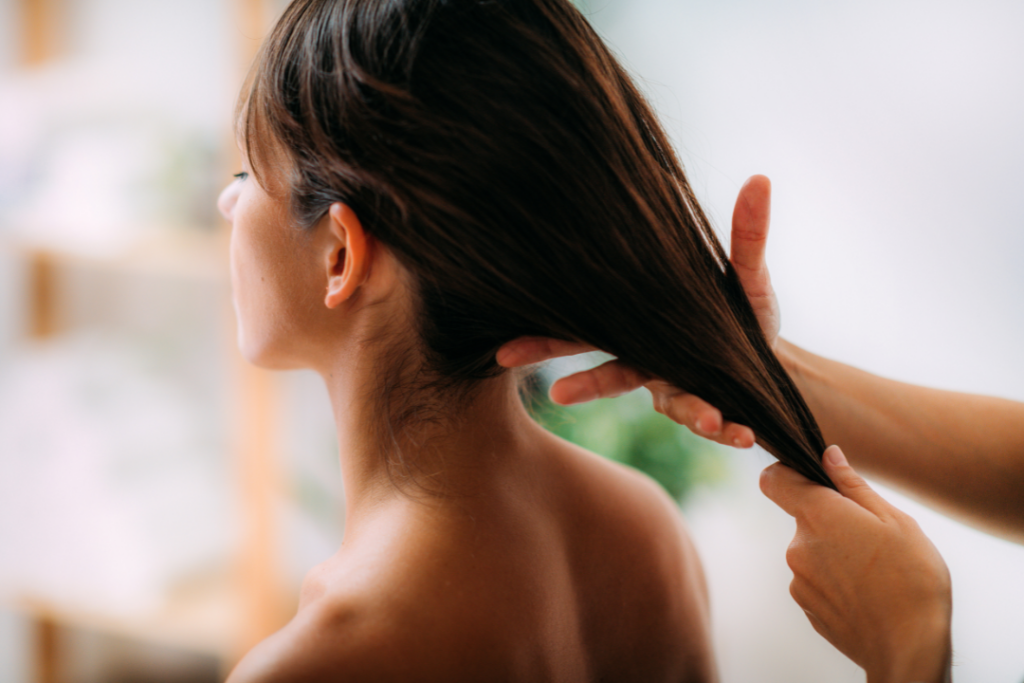Ayurvedic Hair Care

Ayurvedic hair care focuses on maintaining healthy hair and scalp by balancing the three doshas (Vata, Pitta, and Kapha) through natural remedies and holistic practices. Ayurveda offers personalized treatments to address various hair issues such as hair fall, dandruff, premature graying, and dryness, promoting overall hair health and vitality.
Key Principles of Ayurvedic Hair Care
Balancing Doshas:
- Hair health is influenced by the balance of the doshas:
- Vata: Governs dryness and roughness, an imbalance can lead to dry and brittle hair.
- Pitta: Controls heat and metabolism, an imbalance can cause hair thinning, premature graying, and hair fall.
- Kapha: Provides moisture and strength, an imbalance can result in oily scalp and dandruff.
- Hair health is influenced by the balance of the doshas:
Ojas (Vital Energy):
- Ojas, the essence of all bodily tissues, is crucial for maintaining healthy hair. A good level of Ojas reflects in strong, shiny, and healthy hair.
Common Hair Issues Addressed by Ayurveda
Hair Fall (Khalitya):
- Hair fall can be caused by stress, hormonal imbalances, or nutritional deficiencies. Ayurvedic treatments include herbs like Bhringraj, Amla, and Brahmi, along with scalp massages and dietary changes.
Dandruff (Darunaka):
- Characterized by a flaky and itchy scalp, dandruff is often due to an imbalance in the Kapha and Vata doshas. Remedies include Neem oil, Tea tree oil, and herbs like Fenugreek and Aloe Vera.
Premature Graying (Palitya):
- Premature graying is associated with a Pitta imbalance. Ayurvedic treatments include herbs like Bhringraj, Amla, and Shikakai to nourish the scalp and restore natural hair color.
Dry and Brittle Hair:
- Caused by an imbalance in Vata dosha, resulting in dryness and rough texture. Treatments involve moisturizing oils like coconut, sesame, and almond oil, as well as hydrating hair masks.
Ayurvedic Practices for Hair Care
Diet and Nutrition:
- A balanced diet rich in essential nutrients supports healthy hair. Including foods high in proteins, vitamins (especially A, C, D, and E), and minerals like iron and zinc is beneficial. Fresh fruits, vegetables, nuts, seeds, and whole grains are recommended.
Herbal Remedies:
- Bhringraj: Known as the “king of herbs” for hair growth, it strengthens hair roots and prevents hair fall.
- Amla (Indian Gooseberry): Rich in Vitamin C, it enhances hair growth, prevents premature graying, and adds shine.
- Brahmi: Promotes hair growth and reduces stress, which is a common cause of hair loss.
- Neem: Effective in treating dandruff and maintaining scalp health.
Oil Massages (Abhyanga):
- Regular scalp massages with warm oils like coconut, sesame, or Brahmi oil improve blood circulation, nourish the hair follicles, and promote relaxation. Massaging also helps in balancing the doshas and strengthening the hair roots.
Cleansing and Conditioning:
- Using natural shampoos and conditioners made from herbs like Shikakai, Reetha (Soapnut), and Aloe Vera helps cleanse the scalp without stripping natural oils. Conditioning with ingredients like Hibiscus and Fenugreek keeps the hair soft and manageable.
Hair Masks and Packs:
- Applying hair masks made from natural ingredients like yogurt, honey, aloe vera, and hibiscus provides deep conditioning and nourishment. These masks help in moisturizing the hair and improving its texture.
Stress Management:
- Stress is a significant contributor to hair problems. Practicing yoga, meditation, and Pranayama (breathing exercises) helps reduce stress and promote overall well-being, which in turn benefits hair health.
Hydration:
- Drinking plenty of water and staying hydrated helps in maintaining healthy hair. Proper hydration supports the overall health of the scalp and hair.
